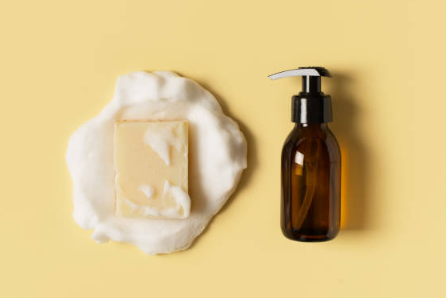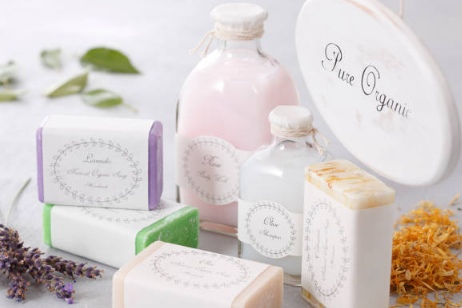There’s no one-size-fits-all answer when it comes to cleansing products—and no body care routine is truly complete without a good cleanser. When it comes to washing your skin from the neck down, the two most popular options are bar soap and body wash. Both help remove dirt and oil, but they come with their own pros and cons. Here’s everything you need to know about each option, so you can decide what works best for you and your skin.
What’s the Difference Between Bar Soap and Body Wash?
Bar soaps and body washes both contain surfactants—cleansing agents designed to lift dirt and oil from the skin. But the way they’re made and formulated differs.
Bar soap is created through a saponification process, where oils or waxes are combined with an alkali (like lye), then left to cure for 6–8 weeks to allow chemical changes to complete.
Body wash, on the other hand, doesn’t require the same process and is generally considered more gentle and less likely to cause dryness. It contains water, which makes it less concentrated than bar soap and allows it to be formulated with various added ingredients like oils, extracts, moisturizers, purifiers, or exfoliants—making it easier to target specific skin concerns.

Bar Soap: Pros and Cons
Pros:
-
One of the biggest benefits of bar soap is that it’s water-free, making it less prone to bacteria growth (as long as it’s stored properly and allowed to dry).
-
Most bar soaps don’t require preservatives.
-
They’re often packaged with minimal or no plastic, making them a more eco-friendly and storage-friendly option.
Cons:
-
Traditional bar soaps tend to have a higher pH level (usually between 9–10), which can disrupt the skin’s natural barrier, especially for sensitive skin types.
-
The high pH can lead to dryness and irritation for some users.
-
Bar soaps have a reputation for leaving behind a residue or film on the skin, which can feel sticky or unpleasant to some people.
That said, many modern bar soaps now include moisturizing ingredients like oils and emollients to reduce the risk of dryness.
Body Wash: Pros and Cons
Pros:
-
Most people find that body wash feels better on the skin, thanks to its smooth, creamy texture and hydrating ingredients.
-
Many body washes contain emollients and ceramides to help keep skin soft and support the skin barrier.
-
They’re more hygienic, since they’re packaged in tubes or bottles, reducing exposure to water or contaminants.
-
Body washes typically have a pH level closer to that of human skin, making them a better option for people with very dry or sensitive skin.
-
Many formulas are designed to be gentle and skin-friendly, making them ideal for conditions like eczema or acne.
Cons:
-
Body washes almost always come in plastic packaging, which contributes to environmental waste (even if recyclable).
-
Because body washes contain water, they require preservatives to prevent mold or bacterial growth—something some “clean beauty” shoppers may wish to avoid.

When to Use Bar Soap vs. Body Wash
-
Choose bar soap if you have relatively normal or sensitive skin and want a product with fewer synthetic additives. Bar soaps are also a great choice if you’re looking for low-waste, eco-friendly packaging.
-
Go for body wash if your skin is very dry, tight, flaky, rough, or itchy. Body washes tend to be more hydrating and soothing, and many are formulated with powerful actives to address specific skin concerns. They’re also ideal for people managing chronic skin conditions like eczema or body acne.
Ingredients to Look For (and Avoid)
Look for these nourishing ingredients in both soaps and body washes:
-
Ceramides
-
Glycerin
-
Avocado oil
-
Argan oil
-
Coconut oil
These help lock in moisture and cleanse without stripping your skin barrier. If you’re looking for gentle exfoliation, consider products with lactic acid or salicylic acid.
Avoid these ingredients, especially if you have sensitive skin:
-
Fragrances – These are common irritants, and companies aren’t required to disclose the exact chemicals used in their scents.
-
Triclosan – A harsh antibacterial agent that can be irritating and may pose health risks. Although banned in over-the-counter soaps in the U.S., triclosan can still appear in international or industrial products.
-
Harsh antibacterial additives – These can strip away good bacteria and leave skin dry or unbalanced.
The Bottom Line:
There’s no wrong choice—just the one that suits your skin and values best. Whether you go with a bar or a body wash, the most important thing is to cleanse gently and moisturize regularly to keep your skin healthy, soft, and balanced.